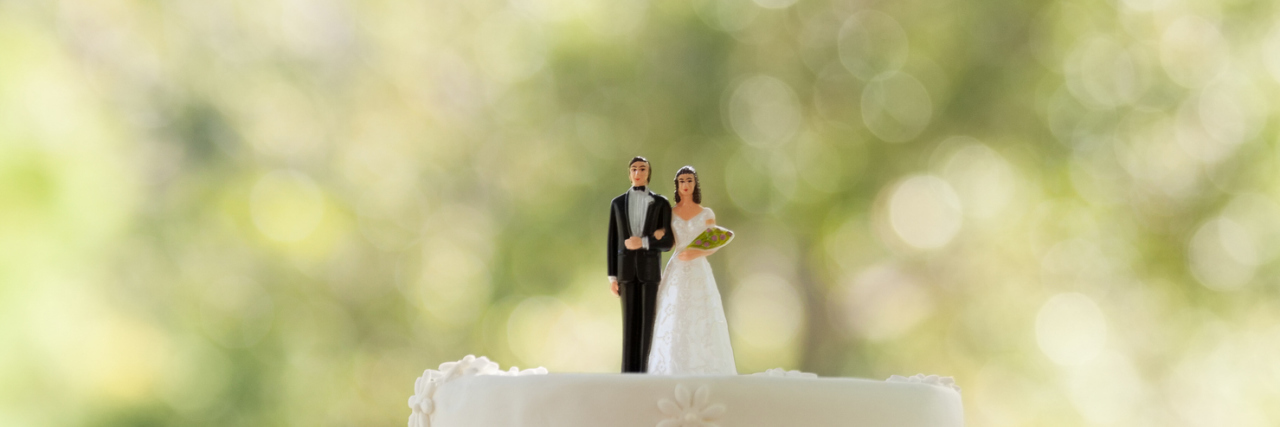When I saw myself in my wedding dress, I cried.
Too much consumption of TLC and romantic comedy’s led me to believe that one’s wedding dress fitting symbolized life transition, beauty and tears of joy about childhood dreams being actualized. In contrast, my wedding dress fitting was wrought with anxiety and panic, rather than joyful tears of celebration at a sentinel life event. I stood there in the store, waiting for the “aha” moment of the dress reveal, but as the seamstress and boutique owner buttoned up the dress, I was struck by how painfully tight the dress felt.
“Did you gain weight since you ordered the dress?” The store owner asked me in the most nonchalant, emotionless way as she checked the dress size.
Despite my best efforts, this question left my heart in a puddle on the ground. I immediately regretted not following my dietitian’s advice to call the store in advance and request no body comments be made during my fitting. I mumbled a response I can’t recall and the seamstress got to work pinning for alterations work. As the seamstress lowered her gaze to insert some more pins into the dress, tears welled up in my eyes.
I couldn’t help my immediate reaction. After being in recovery from an eating disorder and spending the last few years separating from my eating disorder identity, I assumed I wouldn’t be back here, in this place, feeling terror and shame over my body. I didn’t want my initial reaction of seeing myself in my wedding dress to involve fighting off the urge to hide in a corner to cry alone. And yet, here I was.
The berating self-shaming soon followed — you’re so vain and superficial. This should not be a big deal. As a feminist, advocate and activist, I attempted to will myself into a body positive spin on my feelings. I was eating well, I was in recovery, I had re-feeding weight, yes, but there was nothing wrong with my body. I accepted my body no matter what. I recited the common recovery mantras with gritted teeth, hoping all those chapters I read from “Intuitive Eating” during treatment would percolate into my brain and stop the tears.
But here I was, standing there with pins in a form-fitting dress that needed to be let out, staving off the guttural reaction to “ugly cry.”
I finished the appointment, texted a few friends with an SOS message and drove home, still shaking, tear stains burning my face. I came out of this panic state after a few hours and my fiancé held me as I cried in his arms.I wish I could say I ignored all disordered thoughts that creeped into my mind in the following days, but I didn’t.
However, that day I also made a decision. I would not let my dress dictate my eating. Despite my discomfort about the boutique owner’s words, my body can’t take another slip or relapse, and I won’t start out my married life in the midst of restriction related gastrointestinal issues. If that means I can’t fit into my dress and need to search for a thrift store dress at the Salvation Army the day before the wedding, I am willing to do that.
During my next dress fitting, I brought a supportive family member, mentally prepared and focused on the fit of the bustle and train, rather than my body filling out the dress. Even after all these years of eating disorder behaviors, treatment and relapse, it is a hard thing for me to remember I take up space. It’s even harder for me to believe I deserve to take up space.
Getting married can be a huge trigger for body image fears, regardless of whether someone has an eating disorder history. I scroll through my emails and see wedding ad pages targeted to me that emphasize unrealistic expectations of how a woman “should” look on her wedding day.
I have found it helpful to remember that a wedding is an event. It is a day that holds tremendous cultural pressure, but it is still a day. A wedding is a fraction of what it means to spend your days and years in a marriage. Since I value my relationship and self-worth, I am doing what it takes to stay in recovery as I prepare to get married.
As much as I love my wedding dress, I will not crash diet or jeopardize my recovery for a dress. No dress is worth that high of a price.
If you or someone you know is struggling with an eating disorder, you can call the National Eating Disorders Association Helpline at 1-800-931-2237.
We want to hear your story. Become a Mighty contributor here.
Thinkstock photo via Wavebreakmedia Ltd

